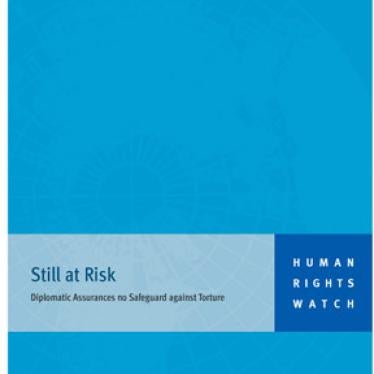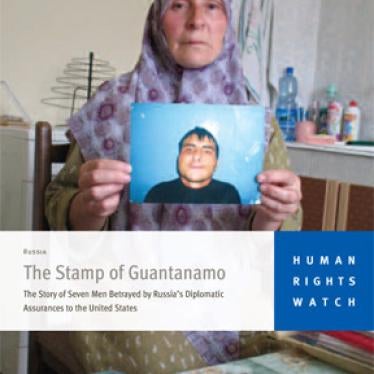(New York, December 16, 2008) - Spain should immediately halt plans to extradite an ethnic Chechen to Russia, where he will be at risk of torture, Human Rights Watch said today.
To secure the extradition of the man, Murat Ajmedovich Gasayev, Russian authorities have offered "diplomatic assurances" that he will not be exposed to torture or other forms of ill-treatment during his detention. Moscow has offered to permit Spanish diplomats to visit Gasayev in custody. But Human Rights Watch research has shown that such promises, including those from Russian authorities, are not reliable as a safeguard against abuse.
"The Spanish authorities appear to want to get rid of Gasayev at any cost," said Julia Hall, senior counterterrorism counsel at Human Rights Watch. "But the empty promises offered by Moscow will not protect him from abuse - only halting the extradition can do that."
Gasayev is wanted in connection with an attack by an armed group on government buildings in the Republic of Ingushetia in June 2004. He was detained for three days in August 2004 by the Federal Security Service (FSB) in Ingushetia, and claims that during his interrogation, he was tortured and ill-treated. He was then released without charge and sought refuge in Spain.
The extradition request appears to be based on subsequent statements by a prisoner in Russian custody who named Gasayev as a participant in the June 2004 actions while under interrogation by the FSB. That detainee later retracted his statement, alleging that he had been subjected to beatings, torture with electricity, and threats against his family.
Moscow failed to honor fair-trial and humane-treatment promises to the United States when it transferred seven Guantanamo Bay detainees to Russia in March 2004.
Furthermore, numerous cases of the torture of ethnic Chechens and Ingush suspected of involvement in the June 2004 events and other acts of insurgency are described in detail by the Moscow-based human rights organization Memorial in its September 2005 report, "A Conveyer of Violence: Human Rights Violations During Anti-Terrorist Operations in the Republic of Ingushetia."
"This case has all the hallmarks of a situation in which there is a real likelihood that torture will be used," said Hall. "Gasayev is from a group that is routinely tortured, he has been mistreated in the past, and the FSB has tortured information out of another prisoner as the foundation for the extradition request. Those are serious red flags that cannot be wished away by the promise of a few visits by Spanish diplomats."
Human Rights Watch expressed these concerns to the Spanish government in a May 2008 letter. In a decision in November, the Audiencia Nacional, a Spanish federal court that hears national security cases, ruled that the Spanish authorities should consult with the Council of Europe to determine if it could arrange to monitor Gasayev's treatment, most likely by engaging the European Committee for the Prevention of Torture (CPT), a European prison-monitoring body.
That monitoring body, which was not consulted prior to the Audiencia Nacional's decision, has frequently expressed serious concerns regarding torture and ill-treatment by law enforcement and security operatives in Chechnya. In fact, the monitoring group has publicly condemned the Russian government three times in recent years for torture abuses in Chechnya and the utter lack of accountability for these crimes.
As an alternative, the Spanish government said it had arranged to have diplomatic staff from its mission in Moscow conduct post-return monitoring visits to Gasayev. On December 1, the Audiencia Nacional approved this arrangement. On December 15, the European Court of Human Rights declined Gasayev's request to issue an injunction against his removal from Spain.
However, Human Rights Watch has documented another case in which the Russian authorities promised access to detention facilities for a monitoring delegation, but then refused to permit the visits.
In that particularly egregious case in 2003, the Russian authorities denied a delegation of the European Court of Human Rights access to five Chechens extradited from Georgia to Russia, despite having promised the court that the men would have unhindered access to appropriate medical treatment, to legal advice, and to the European Court itself. In April 2005, the court found that Russia had violated the European Convention on Human Rights by obstructing the court's fact-finding visit and denying it access to the applicants. The court also ruled that the extradition to Russia of one of the men remaining in Georgia would violate the prohibition of torture, despite the assurances of humane treatment from Moscow.
Even if Spanish diplomats were permitted to visit Gasayev, they could not guarantee his safety. Torture is usually practiced in secret, often using methods that defy detection (e.g. psychological torture, sexual abuse, the use of electricity). And prisoners, fearing reprisals against them or their families, are often afraid to speak with monitors about their abuse.
"The Russians have broken guarantees to permit monitors to visit in the past," said Hall. "Moreover, post-return monitoring cannot keep people safe from abuse that occurs in secret and is intended to intimidate a prisoner, and for which there is no accountability."








